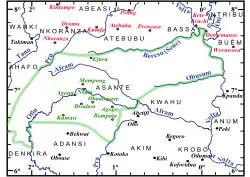Denkyira
Denkyira was a powerful nation of Akan people that existed before the 1620s, in what is now modern-day Ghana. Like all Akans, they originated from Bono state. Before 1620, Denkyira was called Agona. The ruler of the Denkyira was called Denkyirahene and the capital was Jukwaa. The first Denkyirahene was Mumunumfi.[1]
Denkyira | |||||||||
|---|---|---|---|---|---|---|---|---|---|
| 1500 (16th century)–1701 (18th century) | |||||||||
 Location of Denkyira (bottom-left of map); The core area of the Ashanti Nation (green marking) and Denkyira (bottom-left of map) at the beginning of the 1890s. | |||||||||
 | |||||||||
| Capital | Dunkwa-on-Offin | ||||||||
| Common languages | Akan dialect (Twi) | ||||||||
| Religion | Asante Ancestor worship religion and mythology | ||||||||
| Government | Monarchy | ||||||||
• 1637 to 1695 | Boa Amponsem I | ||||||||
• 1695 to 1701(last of indep. Denkyira) | Ntim Gyakari | ||||||||
| History | |||||||||
• Established | 1500 (16th century) | ||||||||
• Renamed Upper Denkyira and Twifo/Heman/Lower Denkyira of Central Ashantiland on the Ashantiland Peninsula | 1957 | ||||||||
| 1701 (18th century) | |||||||||
| |||||||||
| Akan people |
|---|
 |
Later, the capital of Denkyira moved to Abankeseso.[2] The Denkyira state capital is now Dunkwa-on-Offin. Denkyira became powerful through gold production and trade with Europe.
In the 1690s, wars took place between Denkyira and the Asen and Twifo-Heman. The goal of these struggles was to keep open the trade routes to the coast and trade with the Fante State and Europeans.[3]
The Denkyira state together with the Fante states dominated the trade with Europeans in Western Ghana while the Akwamu dominated trade with Europeans in Eastern Ghana.
The Denkyira state dominated the neighboring states apart from the Fante, Akwamu and Akyem.[4]Asantes were subjects and tributary to Denkyira Kingdom until 1701, when with the help of Okomfo Anokye, they defeated them at the Battle of Feyiase, and became a tributary to the Asante Empire.[5] This was led by Ntim Gyakari the then Denkyirahene.
In 1868 Denkyira entered the Fante Confederacy to align with the powerful Fante Union. The Fante Confederacy had also at this time become allies of the British. The Asante Kingdom also were allies of the Dutch people.
The present-day ruler of the Denkyira was Odeefuo Boa Amponsem III until his death was announced on 2 December 2016.[6]
See also
- Rulers of the Akan state of Denkyira
- Upper Denkyira District
- Twifo/Heman/Lower Denkyira District
References
- Shmuel Noah Eisenstadt; Michel Abitbol; Naomi Chazan (1988). The Early State in African Perspective: Culture, Power and Division of Labor. Brill Academic Publishers. ISBN 90-04-08355-3.
- McCaskie, T. C. "Denkyira in the Making of Asante" in Journal of African History Vol 48 (2007) no. 1, p. 1
- McCaskie. "Denkyira". p. 1.
- Akan Laws and Customs. Taylor & Francis.
- Dickson, Kwamina B. (1969). A Historical Geography of Ghana. CUP Archive. ISBN 9780521071024.
- https://web.archive.org/web/20161220073817/http://www.atlfmonline.com/component/k2/item/7341-denkyirahene-reported-dead Denkyirahene reported dead
